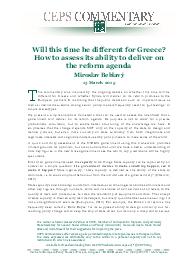Gordon, Jeffrey, Ringe, Georg, (2015), “Greece and the missing banking union”, Voxeu, 17 July The Greek Crisis is a crisis rather than a problem due to the vulnerability of Greek banks. While the banks have deep problems, this column argues that these would have been mitigated if a fully operational banking union were in place. A full banking union requires joint banking supervision, joint bank resolution, and joint deposit insurance. The EZ only …Read More
Reforming Greece
Campos, Nauro, Coricelli, Fabrizio, (2015), “Reforming Greece”, Voxeu, 17 July Greece’s reluctance to implement ‘the structural reforms required for debt sustainability’ is a recurrent theme in the debate on the EZ Crisis. This column qualifies this conventional wisdom by reassessing the relationship between Greece and the EU over the past four decades. Although Greece has implemented structural reforms that were substantial enough to bring about a turning point in its relationship with …Read More
Lessons for Greece: Forcible currency conversions from 1982 to 2015
Reinhart, Carmen, (2015), “Lessons for Greece: Forcible currency conversions from 1982 to 2015”, Voxeu, 9 July Contrary to the intent of the designers of what was to be an irreversible currency union, Greece may well exit the Eurozone. This column argues that default does not inevitably trigger the introduction of a new currency (or the re-activation of an old one). However, if ‘de-euroisation’ is the end game, then a forcible …Read More
Greece: On the Gredge, A Greek exit from the euro may soon become inevitable
Greece: On the Gredge, A Greek exit from the euro may soon become inevitable, The Economist, 25 April 2015. Eventually every long-running drama, from “Downton Abbey” to “Dr Who”, feels formulaic. So it is with Greece’s debt saga. For five years it has followed a wearily familiar script of unpayable debts, aborted reforms and 11th-hour compromises that let the country stagger on inside the single currency. That history has …Read More
Will this time be different for Greece? How to assess its ability to deliver on the reform agenda
Beblavý, Μ. (2015) “Will this time be different for Greece? How to assess its ability to deliver on the reform agenda“, Centre for European Policy Studies (CEPS) Commentary, 13 March. Τhis commentary was inspired by the ongoing debate on whether this time will be different for Greece and whether Syriza will deliver on its reform promises to the European partners. It is striking thatthe public debate on such an …Read More
The Greek Surge against Austerity: A Blessing or a Curse for the Eurozone?
Panagiotarea, Eleni (2015) “The Greek Surge against Austerity: A Blessing or a Curse for the Eurozone?“, Heinrich-Böll-Stiftung – European Union, 08 April 2015. Syriza’s advent of power was supposed to seriously challenge the eurozone’s austerity orthodoxy and put an end to an economic adjustment programme, which saw Greece’s GDP fall by 25 per cent and unemployment rise by 26 per cent. The radical-left populist party was instrumental in exploiting …Read More
Greece requires political reform as much as structural reform of its economy
Tsekeris, C. (2015) “Greece requires political reform as much as structural reform of its economy“, LSE EUROPP, 07 April. The Greek government and its creditors have still not reached an agreement on the release of further financial assistance to the country, despite fears growing over the state of Greece’s finances ahead of a scheduled loan repayment to the IMF on 9 April. Charalambos Tsekeris writes that while the discussions …Read More
Greece And Other Benefit Scroungers
Wren-Lewis, S. (2015) “Greece And Other Benefit Scroungers“, Social Europe Journal, 30 March. Whenever I write a post critical of German views on Eurozone policy, I get comments which can be paraphrased in the following way. Greece (and maybe other Eurozone countries) are incapable of governing themselves properly, and when they get into difficulties Germany has to bail them out, so it is only reasonable that as a price …Read More
Destroying the Greek economy in order to save it – European authorities are using dirty tactics to bring Greece to heel
Mark Weisbrot, Destroying the Greek economy in order to save it – European authorities are using dirty tactics to bring Greece to heel, Al Jazeera America, 30 March 2015. There is a tense standoff right now between the Greek government and the so-called troika — the European Commission, the European Central Bank (ECB), and the International Monetary Fund (IMF). ECB President Mario Draghi went so far this week as …Read More
Greece back on centre stage: the results of a déjà vu summit
Janis A. Emmanouilidis (2015) “Greece back on centre stage: the results of a déjà vu summit“, European Policy Centre, Post-Summit Analysis, 23 March. Summary The March 2015 European Council might not enter history books, but the outcome of an informal ‘mini summit’ between seven EU leaders has the potential to prepare the grounds for a breakthrough in the negotiations between Athens and its lenders. In this post-summit analysis, Janis …Read More





